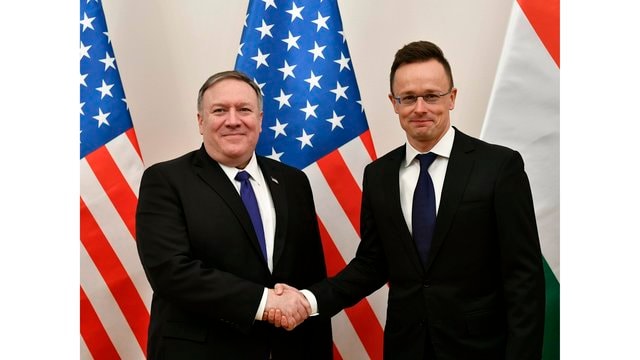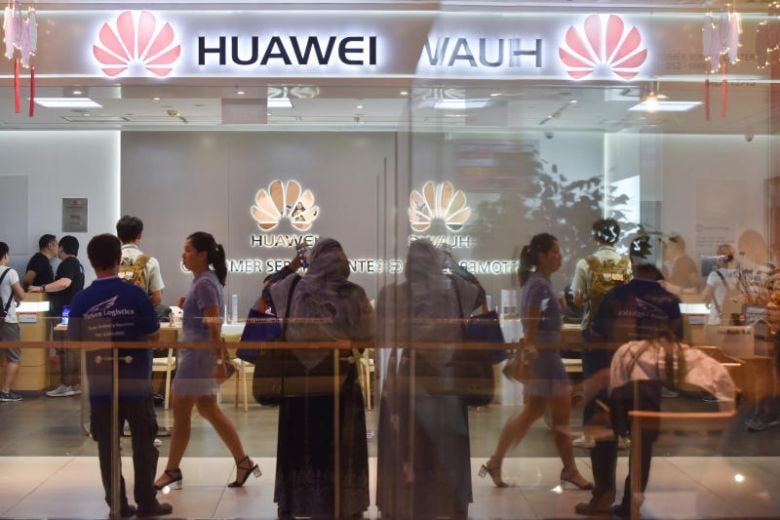US Secretary of State visits Central Europe: Is it easy to gain influence from Russia and China?
(Baonghean) - US Secretary of State Mike Pompeo is on a tour of three Central European countries including Hungary, Slovakia and Poland.
In the context that this region seems to have been “forgotten” by the US for the past ten years, creating conditions for Russia and China to build their position and influence, this visit of Secretary Pompeo is considered a commitment of the US to “return”. However, according to observers, the trip is not an easy task for Mr. Pompeo.
Rediscovering the "forgotten" area
“US Secretary of State visits Central Europe to reaffirm role in the region”, “Secretary of State Pompeo visits Europe amid concerns over the influence of Russia and China”or "Mr. Pompeo warns of risks in cooperation with Huawei"... are prominent headlines in the international press in recent days.
Notably, this is the first high-level US visit to Hungary since former Secretary of State Hillary Clinton’s visit in 2011, and the first high-level US visit to Slovakia in 20 years. It is not difficult to see the central goal of Secretary of State Mike Pompeo’s tour of Central Europe this time.
 |
| US Secretary of State Mike Pompeo and his Hungarian counterpart Peter Szijjarto in Budapest, Hungary. Photo: AP) |
At a press conference before the visit, a senior US administration official said that the “neglect” of Central European countries and the lack of strong commitments in the region over the past decade has created a vacuum that China and Russia can easily fill in many ways.
Looking back over the years, when the US government was not interested in Central Europe, Russia and China had time to "leave" a strong mark in this region. Currently, most of Hungary's gas is imported from Russia; while the country's main source of electricity is also from the power plant invested by Russia's Rosatom corporation with an investment of about 14 billion USD. As for China, Hungary is also one of the countries that benefited the most from Beijing.
Faced with this reality, at his destinations, Mr. Pompeo pointed out the problems and risks related to Central Europe's dependence on Russian energy as well as the presence of Chinese high-tech company Huawei, especially in Hungary.
Accordingly, dependence on Russian energy sources will make Central European countries passive and may face the risk of energy crisis at any time. Mr. Pompeo also called on Hungary not to support the TurkStream pipeline - Russia's main gas transport route to Europe without going through Ukraine.
Meanwhile, according to the US Secretary of State, the presence of Huawei Group is considered to pose a threat to security in the region, as Huawei's equipment can be used for espionage activities.
Not only that, the US Secretary of State will also attack the rather close relationship between Hungarian Prime Minister Victor Orban and Russian President Putin, even "signaling" to the opposition parties in Hungary that Budapest is "turning a blind eye" to Russian intelligence activities on Hungarian soil...
At the same time, Secretary Pompeo also focused on discussing defense relations, urging countries to diversify their energy sources away from dependence on Russia. At other stops, Secretary Pompeo also hoped to turn the relationship around, making the US-Central Europe handshake closer and warmer.
It can be said that this is a message of goodwill that the US wants to send to its Central European allies after a period of focusing on the Middle East or the Indo-Pacific region.
Stormy trip
That is the goal, but according to observers, Mr. Pompeo's trip will face many difficulties, because Central European countries are still largely dependent on Russian energy sources or Chinese development projects.
In response to the US Secretary of State, Hungarian counterpart Peter Szijjarto emphasized that any criticism from Washington about Hungary's diplomatic relations with Russia is wrong, because other European countries are also currently having energy cooperation with Russia.
Mr. Peter Szijjarto also affirmed that Hungary is still fulfilling its obligations to Western countries as a member of the NATO military alliance.
There are some advantages, though, such as in Hungary, where US Secretary of State Pompeo could find common ground with Prime Minister Victor Orban, who has a tough stance on immigration similar to President Donald Trump.
It is also worth mentioning another goal that Secretary Pompeo set during this trip, which is the conference on "The Future of Peace and Security in the Middle East" held in Poland.
The US's aim can be said to be to create an alliance that can counter Iran, because this is an issue that is causing division and conflict within the European Union (EU). It is a fact that leading EU countries such as Germany and France currently have very different views on the Iran issue than the administration of President Donald Trump.
 |
| US Secretary of State Pompeo warned Central European allies to cut ties with China's Huawei. Photo: Strait Times |
While the leading countries and the so-called "second-class" countries of the European Union are facing many gaps and conflicts, the US government, through Mr. Pompeo's visit, clearly wants to take the opportunity to attract these countries to its side.
Although small, a defense cooperation agreement between the US and Hungary, which will allow Budapest to purchase military equipment from Washington during this visit, has shown certain progress in US-Hungary relations.
Along with that are new US initiatives for the region, including anti-corruption or strengthening coordination between the two countries' law enforcement agencies... Not only did US Secretary of State Pompeo offer the "carrot" to Central European countries, he also did not forget to discreetly show the "stick".
Accordingly, in Hungary, Mr. Pompeo, in a speech, both called for a "boycott" of Huawei and implicitly warned that any company that continues to cooperate with the Chinese company may be restricted in accessing US equipment.
It can be said that warming up relations with Central Europe is one of the arrows of President Donald Trump's "America First" strategy.
Of course, facing an American ally with both benefits and pressure, and Russia and China with many economic and social benefits, Central European countries such as Hungary, Slovakia and Poland will not be able to immediately decide which side to lean towards.
So it can be said that, although not yet over, this trip to Central Europe by US Secretary of State Mike Pompeo is just the beginning!

